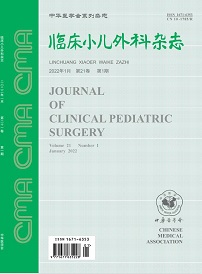Wu Xun,Song Jie,Tang Mi.Application of targeted next-generation sequencing for syndromic congenital heart defects with novel mutations in CHARGE syndrome[J].Journal of Clinical Pediatric Surgery,,21():850-854.[doi:10.3760/cma.j.cn101785-202206003-010]
Application of targeted next-generation sequencing for syndromic congenital heart defects with novel mutations in CHARGE syndrome
- Abstract:
- Objective To analyze the clinical and genetic characteristics of three children with CHARGE syndrome (PMID:10590394) caused by CHD7 (OMIM# 214800) gene mutation, and to explore the application of targeted sequencing in the study of CHARGE syndrome.Methods Genetic diagnostics were performed using a targeted next-generation sequencing panel of 445 candidate genes.New mutations were confirmed by Sanger sequencing.Three CHARGE syndrome patients were further examined with a brief review of literature.Results Through targeted sequencing and screening based on next-generation sequencing platform, new CHD7 variants were found in all three patients:c.G4516A (p.G1506S), c.A5408G (p.Y1803C) and c.C4894T (p.R1632C).Through SIFT, PolyPhen 2, MutationTaster bioinformatics analysis, at least two of the analysis software identified the pathogenic mutation, indicating that the possibility of pathogenic mutation was high.Combined with the clinical manifestations of the three children, including developmental delay, intellectual disability, language disorder, mental disorder, special facial features, skeletal limb changes, heart disease and other clinical manifestations, the clinical manifestations of CHARGE syndrome were highly consistent with those reported previously, and the diagnosis of CHARGE syndrome could be made.Conclusion Targeted next-generation sequencing enables a rapid and accurate genetic diagnosis in syndromic congenital heart disease.
References:
[1] Fahed AC, Gelb BD, Seidman JG, et al.Genetics of congenital heart disease:the glass half empty[J].Circ Res, 2013, 112(4):707-720.DOI:10.1161/CIRCRESAHA.112.300853.
[2] ?yen N, Poulsen G, Boyd HA, et al.Recurrence of congenital heart defects in families[J].Circulation, 2009, 120(4):295-301.DOI:10.1161/CIRCULATIONAHA.109.857987.
[3] Breckpot J, Thienpont B, Arens Y, et al.Challenges of interpreting copy number variation in syndromic and non-syndromic congenital heart defects[J].Cytogenet Genome Res, 2011, 135(3-4):251-259.DOI:10.1159/000331272.
[4] Yohe S, Hauge A, Bunjer K, et al.Clinical validation of targeted next-generation sequencing for inherited disorders[J].Arch Pathol Lab Med, 2015, 139(2):204-210.DOI:10.5858/arpa.2013-0625-OA.
[5] 张婉玉, 叶惟靖, 施锦绣, 等.46, XY性发育异常患儿基因型与临床表现分析[J].临床小儿外科杂志, 2019, 18(12):1036-1042.DOI:10.3969/j.issn.1671-6353.2019.12.010. Zhang WY, Ye WJ, Shi JX, et al.Genotypic and clinical phenotypic analysis of 46, XY disorders of sex development in children[J].J Clin Ped Sur, 2019, 18(12):1036-1042.DOI:10.3969/j.issn.1671-6353.2019.12.010.
[6] Van Ravenswaaij-Arts C, Martin DM.New insights and advances in CHARGE syndrome:Diagnosis, etiologies, treatments, and research discoveries[J].Am J Med Genet C Semin Med Genet, 2017, 175(4):397-406.DOI:10.1002/ajmg.c.31592.
[7] Lalani SR, Safiullah AM, Fernbach SD, et al.Spectrum of CHD7 mutations in 110 individuals with CHARGE syndrome and genotype-phenotype correlation[J].Am J Hum Genet, 2006, 78(2):303-314.DOI:10.1086/500273.
[8] Vervloed MP, Hoevenaars-van den Boom MA, Knoors H, et al.CHARGE syndrome:relations between behavioral characteristics and medical conditions[J].Am J Med Genet A, 2006, 140(8):851-862.DOI:10.1002/ajmg.a.31193.
[9] Morton SU, Quiat D, Seidman JG, et al.Genomic frontiers in congenital heart disease[J].Nat Rev Cardiol, 2022, 19(1):26-42.DOI:10.1038/s41569-021-00587-4.
[10] Pierpont ME, Brueckner M, Chung WK, et al.Genetic basis for congenital heart disease:revisited:a scientific statement from the american heart association[J].Circulation, 2018, 138(21):e653-e711.DOI:10.1161/CIR.0000000000000606.
[11] Tellier AL, Cormier-Daire V, Abadie V, et al.CHARGE syndrome:report of 47 cases and review[J].Am J Med Genet, 1998, 76(5):402-409.DOI:10.1002/(sici)1096-8628(19980413)76:5<402::aid-ajmg7>3.0.co;2-o.
[12] Blake KD, Prasad C.CHARGE syndrome[J].Orphanet J Rare Dis, 2006, 1:34.DOI:10.1186/1750-1172-1-34.
[13] Clementi M, Tenconi R, Turolla L, et al.Apparent CHARGE association and chromosome anomaly:chance or contiguous gene syndrome[J].Am J Med Genet, 1991, 41(2):246-250.DOI:10.1002/ajmg.1320410223.
[14] Hsu P, Ma A, Wilson M, et al. CHARGE syndrome:a review[J].J Paediatr Child Health, 2014, 50(7):504-511.DOI:10.1111/jpc.12497.
[15] Zentner GE, Layman WS, Martin DM, et al.Molecular and phenotypic aspects of CHD7 mutation in CHARGE syndrome[J].Am J Med Genet A, 2010, 152A(3):674-686.DOI:10.1002/ajmg.a.33323.
[16] Butcher DT, Cytrynbaum C, Turinsky AL, et al.CHARGE and kabuki syndromes:gene-specific dna methylation signatures identify epigenetic mechanisms linking these clinically overlapping conditions[J].Am J Hum Genet, 2017, 100(5):773-788.DOI:10.1016/j.ajhg.2017.04.004.
[17] Jongmans MC, Admiraal RJ, van der Donk KP, et al.CHARGE syndrome:the phenotypic spectrum of mutations in the CHD7 gene[J].J Med Genet, 2006, 43(4):306-314.DOI:10.1136/jmg.2005.036061.
[18] Sanlaville D, Etchevers HC, Gonzales M, et al.Phenotypic spectrum of CHARGE syndrome in fetuses with CHD7 truncating mutations correlates with expression during human development[J].J Med Genet, 2006, 43(3):211-217.DOI:10.1136/jmg.2005.036160.
[19] Van Nostrand JL, Brady CA, Jung H, et al.Inappropriate p53 activation during development induces features of CHARGE syndrome[J].Nature, 2014, 514(7521):228-232.DOI:10.1038/nature13585.
[20] Thomeer HG, Crins TT, Kamsteeg EJ, et al.Clinical presentation and the presence of hearing impairment in branchio-oculo-facial syndrome:a new mutation in the TFAP2A gene[J].Ann Otol Rhinol Laryngol, 2010, 119(12):806-814.DOI:10.1177/000348941011901204.
[21] Foppiani L, Maffè A, Forzano F.CHARGE syndrome as unusual cause of hypogonadism:endocrine and molecular evaluation[J].Andrologia, 2010, 42(5):326-330.DOI:10.1111/j.1439-0272.2009.00994.x.
Memo
收稿日期:2022-05-23。
基金项目:湖南省自然科学基金(2022JJ30840, 2020JJ5831)
通讯作者:唐幂,E-mail:tangmi1129@163.com
